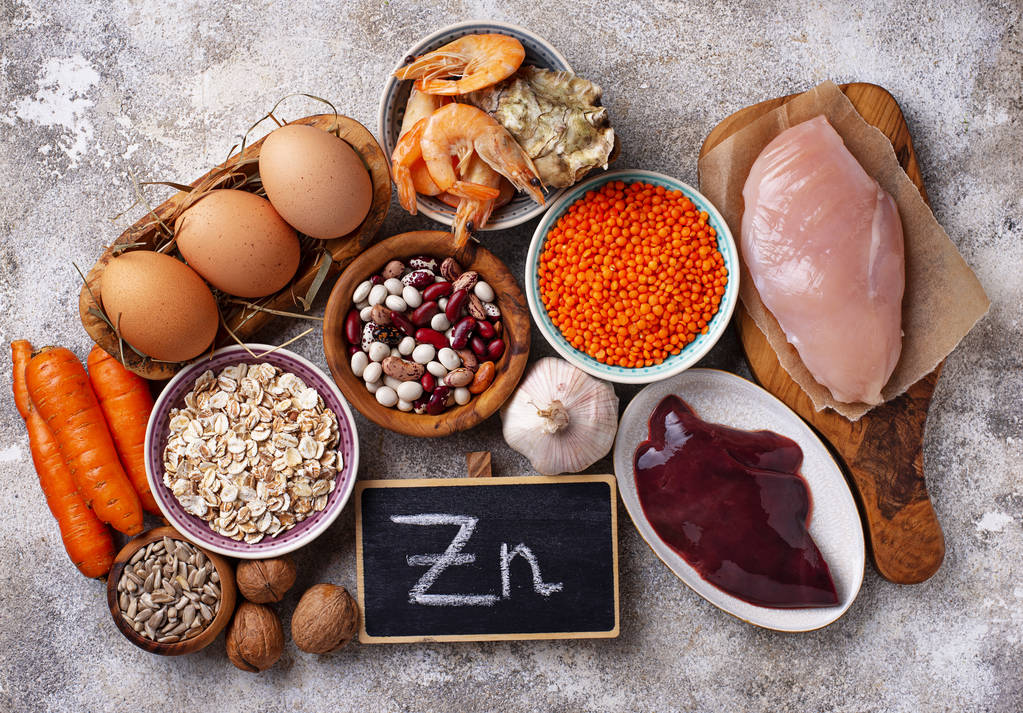Discover the fascinating relationship between zinc and metabolism in this informative article.
How Does Zinc Affect Metabolism?
Have you ever wondered how certain minerals influence our body’s metabolism? Well, one such mineral that plays a vital role is zinc. Yes, that little trace element has more power than you might think! In this article, we’ll delve deep into the world of zinc and explore its fascinating connection to metabolism. So, fasten your seatbelts, folks, because we’re about to embark on a mineral-filled adventure!

Understanding the Role of Zinc in the Body
First things first, let’s talk about zinc itself. Zinc is an essential trace mineral, meaning our bodies need it in small amounts for optimal functioning. It’s involved in various biological functions, making it a true superstar in our metabolic processes.
But what exactly is zinc and why is it so important? Zinc is a naturally occurring element that is found in the earth’s crust. It is essential for the proper functioning of our bodies and is involved in numerous enzymatic reactions. In fact, zinc is involved in over 300 enzymatic reactions in the body, making it one of the most important minerals for our overall health.
One of the key roles of zinc is its involvement in DNA synthesis. DNA is the genetic material that carries the instructions for the development and functioning of all living organisms. Without zinc, our bodies would not be able to properly replicate and repair DNA, which is crucial for growth, development, and overall health.
In addition to its role in DNA synthesis, zinc also plays a vital role in immune system regulation. Our immune system is responsible for defending our bodies against harmful pathogens, such as bacteria and viruses. Zinc helps to support the function of immune cells, such as T cells and natural killer cells, which are essential for a strong and effective immune response.
But that’s not all! Zinc is also involved in wound healing. When we get a cut or a scrape, our bodies go into overdrive to repair the damaged tissue. Zinc is needed for the production of collagen, a protein that helps to strengthen and repair the skin. Without zinc, the wound healing process would be slower and less effective.
Furthermore, zinc is essential for the growth and development of cells. It plays a crucial role in cell division, which is necessary for the growth and repair of tissues throughout the body. Without zinc, our bodies would not be able to properly produce new cells, leading to impaired growth and development.
Lastly, zinc even plays a role in neurotransmitter function. Neurotransmitters are chemicals that transmit signals between nerve cells in the brain. Zinc is involved in the synthesis and release of neurotransmitters, such as dopamine and serotonin, which are important for mood regulation and overall brain function.
Zinc: An Essential Trace Mineral
Before we dive into the nitty-gritty details, let’s take a moment to appreciate the importance of zinc. Despite its small quantities, zinc is involved in over 300 enzymatic reactions in the body. From DNA synthesis to immune system regulation, this mineral wears many hats!
Zinc is considered an essential trace mineral because our bodies require it in small amounts for optimal health. Although it is only needed in small quantities, zinc plays a crucial role in numerous biological functions. Without zinc, our bodies would not be able to function properly and we would be at risk for various health problems.
It’s important to note that our bodies do not naturally produce zinc, so we must obtain it through our diet. Good sources of zinc include meat, seafood, nuts, seeds, and legumes. However, it can be challenging to get enough zinc solely through diet, especially for vegetarians or individuals with certain medical conditions. In such cases, zinc supplements may be recommended to ensure adequate intake.
Biological Functions of Zinc
So, what does zinc actually do? Well, let me give you a sneak peek of its incredible capabilities. Zinc aids in wound healing, supports the growth and development of cells, and even plays a role in neurotransmitter function. Talk about a versatile mineral!
When it comes to wound healing, zinc is essential for the production of collagen, a protein that helps to strengthen and repair the skin. Collagen is the main component of connective tissues, such as tendons, ligaments, and skin. Without zinc, the production of collagen would be impaired, leading to delayed wound healing and increased risk of infection.
Zinc also plays a crucial role in the growth and development of cells. It is necessary for cell division, which is the process by which cells replicate and create new cells. This is particularly important during periods of rapid growth, such as infancy, childhood, and adolescence. Without sufficient zinc, our bodies would not be able to properly produce new cells, leading to impaired growth and development.
In addition to its role in wound healing and cell growth, zinc is involved in neurotransmitter function. Neurotransmitters are chemicals that transmit signals between nerve cells in the brain. Zinc is necessary for the synthesis and release of neurotransmitters, such as dopamine and serotonin, which are important for mood regulation, memory, and overall brain function.
Furthermore, zinc is essential for the proper functioning of the immune system. It helps to support the function of immune cells, such as T cells and natural killer cells, which are responsible for identifying and destroying harmful pathogens. Without sufficient zinc, our immune system would be compromised, making us more susceptible to infections and diseases.
As you can see, zinc is truly a remarkable mineral with a wide range of biological functions. From wound healing to cell growth, and even neurotransmitter function, zinc plays a crucial role in keeping our bodies healthy and functioning optimally.
The Connection Between Zinc and Metabolism
Now that we understand zinc’s multifaceted nature, let’s uncover its connection to metabolism.
Metabolism, the complex set of chemical reactions that occur within our bodies, is responsible for converting the food we eat into energy and building blocks for growth and repair. It is a vital process that keeps our bodies functioning optimally.
Zinc’s Impact on Metabolic Processes
Zinc serves as a cofactor for various enzymes involved in metabolic pathways. In simple terms, it plays a crucial role in helping these enzymes carry out their work effectively. These enzymes are responsible for breaking down carbohydrates, proteins, and lipids, which are the major sources of energy for our bodies.
Carbohydrate metabolism, one of the key processes influenced by zinc, involves the breakdown of complex carbohydrates into simpler sugars, such as glucose. This process is essential for providing energy to our cells and tissues. Zinc helps activate enzymes that facilitate this breakdown, ensuring a smooth and efficient conversion of carbohydrates into usable energy.
Protein synthesis, another metabolic process influenced by zinc, is responsible for building and repairing tissues, producing enzymes and hormones, and supporting immune function. Zinc is involved in the synthesis of proteins, ensuring that the body can effectively utilize the amino acids obtained from dietary protein sources.
Lipid metabolism, the process of breaking down fats and utilizing them for energy, is also influenced by zinc. This mineral helps activate enzymes that break down fats into fatty acids and glycerol, which can then be used as a source of energy or stored for future use.
As you can see, zinc’s impact on metabolic processes is far-reaching and essential for maintaining overall health and well-being. It ensures that our bodies can efficiently convert the nutrients we consume into usable energy and building blocks.
The Role of Zinc in Energy Metabolism
Who doesn’t want a boost in energy? Well, my friend, zinc might just be the mineral you’re looking for! It contributes to energy metabolism by helping convert the food we eat into usable energy.
When we consume carbohydrates, proteins, and fats, our bodies break them down through various metabolic processes to release energy. Zinc plays a crucial role in these processes by activating enzymes that facilitate the breakdown and utilization of these nutrients.
For example, in carbohydrate metabolism, zinc helps activate enzymes called amylases, which break down complex carbohydrates into simple sugars. These sugars are then converted into energy through a series of chemical reactions, with the help of other enzymes that are also influenced by zinc.
In protein metabolism, zinc is involved in the activation of enzymes that break down proteins into amino acids. These amino acids can then be used to produce energy or to build and repair tissues in the body.
Similarly, in lipid metabolism, zinc helps activate lipases, enzymes that break down fats into fatty acids and glycerol. These fatty acids can be utilized as an energy source or stored for future use.
So, the next time you need that extra oomph, remember to thank zinc! Its role in energy metabolism ensures that the food you eat is efficiently converted into the energy your body needs to thrive.
Zinc Deficiency and Its Effects on Metabolism
Now that we know how vital zinc is for our body’s metabolic processes, let’s explore what happens when we lack this essential mineral.
Symptoms of Zinc Deficiency
Sorry to burst your bubble, but zinc deficiency can lead to some not-so-fun symptoms. These may include impaired growth, delayed wound healing, hair loss, skin rashes, and even a weakened immune system. Yikes! It’s clear that zinc deficiency is no joke when it comes to our metabolism.
How Zinc Deficiency Affects Metabolic Health
When it comes to metabolism, zinc deficiency can cause disruptions in various ways. It can impair insulin function, leading to imbalances in blood sugar levels. Additionally, it may hinder the body’s ability to break down and utilize nutrients efficiently. Not exactly what we want for our metabolic health, right?
The Benefits of Zinc for Metabolic Health
Alright, enough with the gloom and doom of zinc deficiency! Let’s shift our focus to the positive side and explore the wonderful benefits of zinc for our metabolic health.
Zinc and Weight Management
Are you tired of battling those extra pounds? Well, zinc might just be your weight management ally! This mineral not only helps regulate appetite but also plays a role in the breakdown and utilization of fats. So, grab that handful of zinc-rich nuts and get ready to shed those unwanted pounds!
Zinc and Blood Sugar Control
Blood sugar rollercoaster got you feeling dizzy? Fear not, because zinc is here to save the day! This mineral supports insulin function, helping to maintain stable blood sugar levels. So, say goodbye to those sugar crashes and hello to balanced energy throughout the day!
How to Maintain Optimal Zinc Levels
Now that we’ve established the importance of zinc for our metabolism let’s discuss how we can ensure we’re getting enough of this superhero mineral.

Dietary Sources of Zinc
The good news is, you can find zinc in a variety of delicious foods! Beef, poultry, seafood, nuts, seeds, and whole grains are all excellent sources of this mighty mineral. So, get creative in the kitchen and whip up some zinc-packed meals to nourish your body and support your metabolism!
Zinc Supplements: Pros and Cons
If you’re unable to meet your zinc needs through diet alone, supplements can be a convenient alternative. However, it’s essential to consult with a healthcare professional before adding any supplements to your routine. Remember, balance is key!
In conclusion, zinc may be a trace mineral, but its impact on our metabolism is undeniable. From aiding in energy metabolism to supporting weight management and blood sugar control, zinc plays a crucial role in keeping our bodies functioning optimally. So, let’s raise a glass to zinc and give this mighty mineral the appreciation it deserves!







